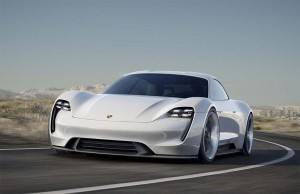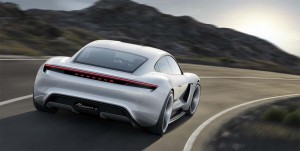It already builds several plug-in models, including the plug-in 918 Spyder, but Porsche is about to go the next step with plans to launch its first pure battery-electric supercar, the Mission E.
The maker will spend “around” 1 billion euros, or $1.1 billion, to bring the high-performance electric vehicle to market, a figure that includes an all-new assembly line and paint shop in the Stuttgart suburb of Zuffenhausen. It will create as many as 1,000 new jobs.
The Porsche Mission E will mark “the beginning (of) a new chapter in the history of the sports car,” said Oliver Blume, the chairman of Porsche’s Executive Board.
Though it clearly borrows a little bit of its styling from the iconic Porsche 911, the Mission E will be a four-door, four-seater, more in line with the current Panamera model.
The Porsche Mission E will deliver a maximum output of 600 horsepower, or 440 kilowatts, according to the maker, and will be able to launch from 0 to 100 kmh, or 62 mph, in 3.5 seconds. That’s actually about a half-second slower than the Tesla Model S equipped with the new Ludicrous Mode option.
(Fast, faster, fastest? Porsche to unveil new 911 Turbo, Turbo S models. For more, Click Here.)
In terms of range, however, the Porsche Mission E actually could top its Silicon Valley rival. It promises a range of “more than 500 kilometers,” or at least 310 miles, per charge, about 5 to 10% more than the highest-rated Tesla Model S. It wasn’t clear if the company was using U.S. or European calculations, however, as range and fuel economy calculations typically are as much as a third higher using EU testing procedures.
Significantly, Porsche says it will equip the Mission E to use the latest Level IV 800-volt charging system, which is twice as powerful as the current Level III quick-charge technology. That currently is offered in only a handful of locations anywhere in the world but battery-car proponents say it will be a critical development in making electric vehicle technology more competitive with conventional, gas-powered vehicles.
Using that technology, Porsche suggests it would be able to get an 80% recharge in just 15 minutes. While the maker didn’t reveal specific details, that would suggest the Porsche Mission E will carry somewhere north of 90 kilowatt-hours of lithium-ion batteries.
The German maker also noted the Mission E will be equipped with an inductive charging system that would allow an owner to simply pull the car over a coil system on the floor of their garage. It would be slower but not require plugging in.
Porsche is expected to share some of the underlying technology with sibling brands Volkswagen and Audi. The latter brand recently confirmed plans to launch a production version of the e-tron Quattro Concept SUV first shown at the Frankfurt Motor Show in September. That model will also offer more than 500 km range, Audi promised.
(Justice Department, VW want diesel lawsuits heard in Detroit. For more, Click Here.)
In an interview with TheDetroitBureau.com, officials with Audi and Volkswagen have said they expect to see a sharp tumble in the price of lithium-ion technology by the time the Audi e-tron SUV and Porsche Mission E come to market. At the beginning of the decade, a kilowatt-hour of battery cells cost almost $1,000. The VW corporate target for 2018 is around $165 or less.
Separately, batteries are coming down in mass and weight – as are electric motors and electronic control systems – even as they produce more power.
“With Mission E, we are making a clear statement about the future of the brand,” said Wolfgang Porsche, chairman of the Supervisory Board of Porsche AG. “Even in a greatly changing motoring world, Porsche will maintain its front-row position with this fascinating sports car.”
Where the first battery-based vehicles to market – like the Chevrolet Volt and Nissan Leaf – were relatively slow and limited in electric range, there’s a sudden push to deliver better performance and longer driving distances. Proponents believe that, with battery prices falling and charging stations becoming easier to find, electric vehicles will begin to develop a more mass-market appeal.
General Motors is directly targeting mainstream buyers with the 200-mile, $35,000 Chevrolet Bolt debuting later this year, as is Tesla with the planned Model III. But much of the push is still focused on the luxury market where makers like Audi, BMW, Mercedes-Benz, even Bentley, are developing plug-ins and pure battery-electric models.
(Facing fines, legal bills, VW slashes spending. Click Here for the full story.)
Porsche offers a number of plug-ins, including its top-line 918 Spyder. Ferrari and McLaren also showed the potential for electrified supercars with their hybrid flagships, the LaFerrari and P1.



It is odd that Porsche would target a 0-60 performance level over a halt second slower than today’s Model S for a product that won’t be on the market for about 4 years. This either demonstrates how technologically far ahead Tesla is or some degree of conservativism by the Porsche management team. Also, Tesla isn’t standing still so their range should improve over the next 3-4 years and probably be well above 310 miles. Hopefully, this 500km range is not the overly optimistic/misleading NEDC estimate.
I like the styling. They deserve credit for pushing the envelope on DC Fast Charging (DCFC).. Note: it’s technically not called level3 charging according to SAE International. But Tesla may be already faster than Porsche by 2018 with their liquid cooled cord SuperCharger cables (not discussed much yet). I also give Porsche credit for wireless charging. If it is priced in the Panamera range, the MissionE finally looks like they are building a vehicle that can leverage the advantages of full electric drive to make a compelling product.